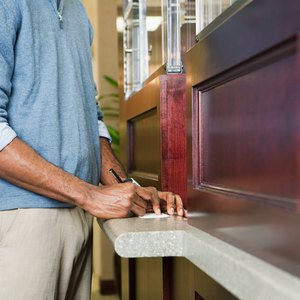
Who is responsible for fraudulent withdrawals from a checking account depends on the nature of the withdrawals and when you discover them and report them to your bank. As soon as you notice fraudulent withdrawals from your checking account, you should contact your bank or financial institution immediately. The longer you wait to report withdrawals, the more likely you will be forced to assume responsibility.
Fraudulent Electronic Withdrawals
The Electronic Fund Transfer Act provides consumers relief from fraudulent electronic transactions. If you report a loss within two days of discovery, you will only be responsible for $50. If you report a fraudulent transaction after two days but within 60 days, your losses are limited to $500. If you fail to report a fraudulent transaction within 60 days of discovery, you may face liability for the entire amount of the fraudulent transaction unless your bank has additional safeguards that go above those provided by the law.
Consumer Negligence
Even if the fraudulent transaction is your fault because you may have fallen for an online phishing scam or left your PIN number somewhere where it was obtained by a thief, your liability is limited to the Transfer Act law's provisions described above. Your bank may initially try to claim that the fraudulent transactions are your fault, so be sure to assert your rights. Federal law is clear – negligence does not reduce your rights. Of course, you'll want to take steps to prevent this from happening in the future. You can change your passwords to include numbers and symbols, check your monthly statements religiously and start using two-step identification.
Forged Checks
Because forged checks can result in a fraudulent withdrawal from a checking account without any type of electronic transaction, they are not covered under the Electronic Fund Transfer Act. If you're a victim of forged checks, call your bank immediately. The bank will be responsible for reimbursing you unless it can show that it accepted the check in good faith and exercised ordinary care and diligence in handling the transaction.
Common Scams
One of the most common scams involving checks and checking accounts involves sending the target a fake check, then requesting that money be wired back to the sender. Depending on the circumstances, you can be held personally liable if you fall for this type of scam. Avoid any transactions in which you are asked to pay taxes, fees or a refund from a check sent to you by a third party.
References
- NBC News: Know Your Rights on Bank Account Fraud
- Bank Info Security: Customer Vs. Bank -- Who is Liable for Fraud Losses?
- Federal Trade Commission: Fake Checks
- U.S. Department of Treasury: Answers about Forgery and Fraud
- Bank of America: Security Center
- Federal Reserve: Electronic Funds Transfer Act
Writer Bio
Louis Kroeck started writing professionally under the direction of Andrew Samtoy from the "Cleveland Sandwich Board" in 2006. Kroeck is an attorney out of Pittsburgh, Pennsylvania specializing in civil litigation, intellectual property law and entertainment law. He has a B.S from the Pennsylvania State University in information science technology and a J.D. from Case Western Reserve University in Cleveland, Ohio.

